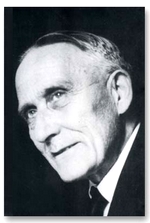
Christianity and Islam are the two largest religions in the world, with 2.8 billion and 1.9 billion adherents, respectively. Both religions are considered as Abrahamic, and are monotheistic, originating in the Middle East.

Louis Massignon was a Catholic scholar of Islam and a pioneer of Catholic-Muslim mutual understanding. He was an influential figure in the twentieth century with regard to the Catholic church's relationship with Islam. He focused increasingly on the work of Mahatma Gandhi, whom he considered a saint. He also played a role in Islam being accepted as an Abrahamic Faith among Catholics. Some scholars maintain that his research, esteem for Islam and Muslims, and cultivation of key students in Islamic studies largely prepared the way for the positive vision of Islam articulated in the Lumen gentium and the Nostra aetate at the Second Vatican Council. Although a Catholic himself, he tried to understand Islam from within and thus had a great influence on the way Islam was seen in the West; among other things, he paved the way for a greater openness inside the Catholic Church towards Islam as it was documented in the pastoral Vatican II declaration Nostra aetate.
Hispanic and Latino American Muslims are Hispanic and Latino Americans who are of the Islamic faith. Hispanic and Latino Americans are an ethnolinguistic group of citizens of the United States with origins in Spain and Latin America. Islam is an Abrahamic, monotheistic religion teaching that there is only one God (Allah), and that Muhammad is a messenger of God. The primary scriptures of Islam are the Quran, claimed to be the verbatim word of God, and the teachings and normative examples of Muhammad. Muslims believe that Islam is the complete and universal version of a primordial faith that was revealed many times before through prophets including Adam, Abraham, Moses and Jesus, and the Quran in its Arabic to be the unaltered and final revelation of God. The Spaniards took the Roman Catholic faith to Latin America via imperialism and colonialism; Roman Catholicism continues to be the largest, but not the only, religious denomination among most Hispanics. In contrast, the Arabs took Islam to very few Latin American countries such as Mexico, El Salvador, Guatemala and Colombia via post-independence immigration.
Forced conversion is the adoption of a different religion or the adoption of irreligion under duress. Someone who has been forced to convert to a different religion or irreligion may continue, covertly, to adhere to the beliefs and practices which were originally held, while outwardly behaving as a convert. Crypto-Jews, crypto-Christians, crypto-Muslims and crypto-Pagans are historical examples of the latter.
Growth of religion involves the spread of individual religions and the increase in the numbers of religious adherents around the world. Statistics commonly measure the absolute number of adherents, the percentage of the absolute growth per-year, and the growth of converts in the world.

Christian population growth is the population growth of the global Christian community. According to a 2011 Pew Research Center survey, there were more than 2.2 billion Christians around the world in 2010, more than three times as many as the 600 million recorded in 1910. However, this rate of growth is slower than the overall population growth over the same time period. In 2020 It’s estimated to be around 2.4 Billion Christians in the world according to Pew. According to various scholars and sources, high birth rates and conversions in the global South were cited as the reasons for the Christian population growth.
The main religion in Morocco is Islam, which is the state religion, however freedom of religious belief isn't always guaranteed to all. Officially, 99% of the population are Muslim, and virtually all of those are Sunni. Polls and surveys have found that 80–95% of its population is at least somewhat religious. The second-largest religion in the country is Christianity, but most Christians in Morocco are foreigners. There is a community of the Baháʼí Faith. Only a fraction of the former number of Jews have remained in the country, many having moved to Israel.

Joseph Fadelle, is a Roman Catholic convert from Islam and a writer born in 1964 in Iraq in a Muslim Shiite family.

The term Laraman in Albanian refers to crypto-Christians who adhered to Islam officially but continued to practice Christianity within the household during the Ottoman era. It was derived from the Albanian adjective i larmë, meaning "variegated, motley, two-faced", a metaphor of "two-faithed" (l'arë), a reference to the Laramans following both Christianity and Islam (nominally).

The First Rebellion of the Alpujarras was a series of uprisings by the Muslim population of the Kingdom of Granada, Crown of Castile against their Catholic rulers. They began in 1499 in the city of Granada in response to mass forced conversions of the Muslim population to the Catholic faith, which were perceived as violations of the 1491 Treaty of Granada. The uprising in the city quickly died down, but it was followed by more serious revolts in the nearby mountainous area of the Alpujarras. The Catholic forces, on some occasions led personally by King Ferdinand, succeeded in suppressing the revolts and inflicted severe punishment on the Muslim population.
Religious syncretism exhibits the blending of two or more religious belief systems into a new system, or the incorporation of beliefs from unrelated traditions into a religious tradition. It is contrasted by the idea of multiple religious belonging and polytheism, respectively.





